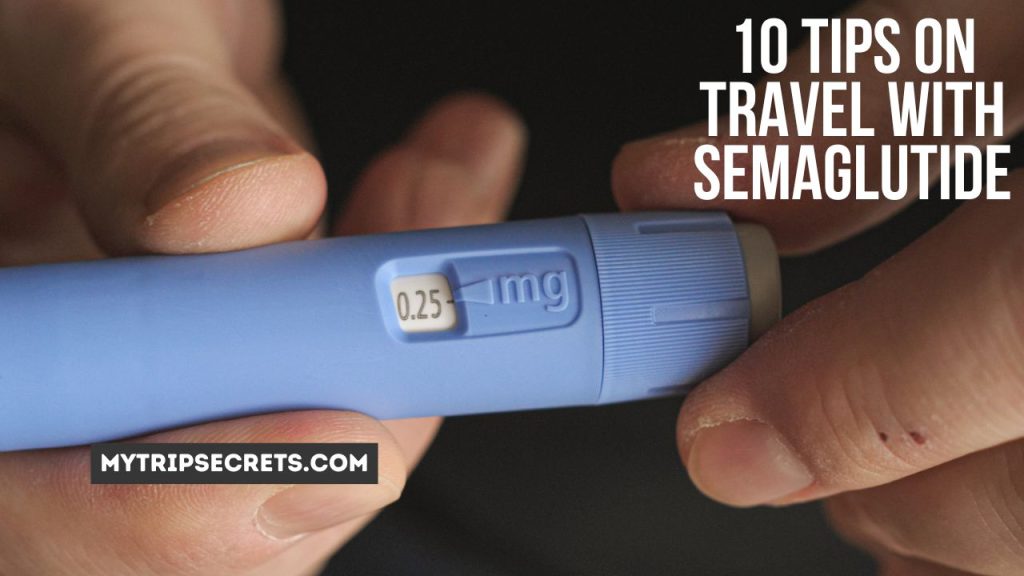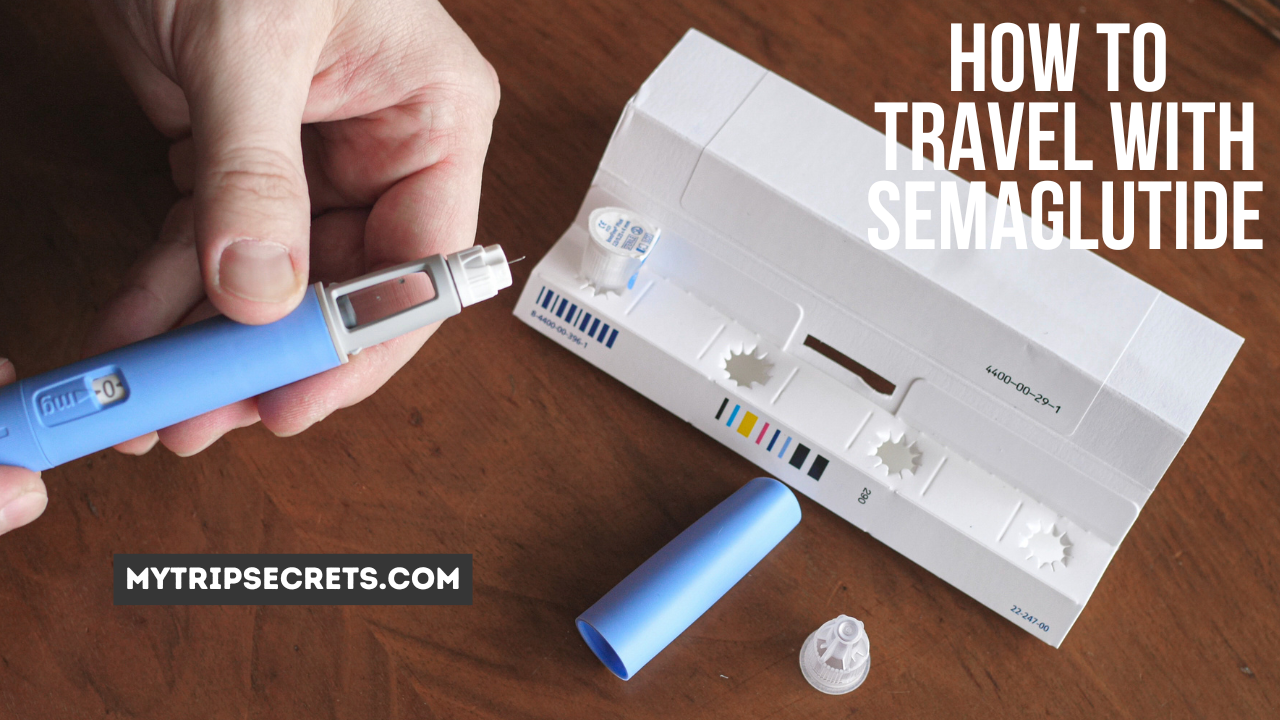Semaglutide is an injectable medication used to improve blood sugar levels in adults with type 2 diabetes. It can also be used for chronic weight management in adults with obesity or overweight with at least one weight-related condition. Traveling while taking semaglutide requires some planning and preparation to ensure proper storage and administration of the medication. This article provides tips for traveling with semaglutide.
Maintaining your treatment regimen, dietary needs, and a healthy lifestyle is also harder but important for managing your condition effectively even while on the go. This article explores key tips and planning steps for travelers taking semaglutide to ensure you vacation smoothly without disrupting or complicating your vital medication protocol. Learn best practices for transporting injectable semaglutide pens or bottles, adjusting dosage schedules across time zones, understanding storage times out of refrigeration, airport security rules, documentation to carry, diet and exercise adaptions abroad, plus health insurance considerations.
Contents
- 1 How to Travel with Semaglutide
- 2 Administering Semaglutide During Travel
- 3 Travel Documentation and Considerations
- 4 Diet, Exercise & Healthy Lifestyle Considerations
- 5 10 Tips For Traveling With Semaglutide On A Plane
- 6 Tip 1: Carry Your Prescription and Documentation With You
- 7 Tip 2: Alert TSA Agents During Security Screening
- 8 Tip 3: Use a Cooler Bag with Ice Packs
- 9 Tip 4: Know Room Temperature Storage Times
- 10 Tip 5: Pack a Backup Travel Refrigeration Option
- 11 Tip 6: Set Injection Reminder Alerts
- 12 Tip 7: Carry Proper Sharps Waste Containers
- 13 Tip 8: Have Compatible Snacks On Hand
- 14 Tip 9: Understand Your Destination’s Import Laws
- 15 Tip 10: Consider Travel Insurance Coverage
- 16 Frequently Asked Questions
- 17 Conclusion
How to Travel with Semaglutide
When traveling with semaglutide, proper storage of the medication is crucial to maintaining its effectiveness. Here are some key storage tips:
Keep Semaglutide Refrigerated
- Semaglutide should be stored between 36°F to 46°F (2°C to 8°C).
- Pack semaglutide pens or vials in an insulated cooler bag with ice packs.
- Ensure ice packs are frozen solid before packing and provide adequate insulation.
- Avoid direct contact between the pens and the ice packs. Wrap in a layer of bubble wrap or towel first.
Know Room Temperature Storage Times
- An unopened semaglutide pen or vial can be kept at room temperature (below 86°F or 30°C) for up to 30 days.
- An opened pen or vial can be kept out of the refrigerator but at room temperature for up to 56 days.
- Write the date removed from refrigeration on opened pens or vials.
Have a Backup Travel Cooler
- Bring along a small travel cooler as a backup in case you need to store opened semaglutide pens or vials for an extended time out of refrigeration.
- This also provides contingency storage if ice packs thaw sooner than expected.
| Type | Storage |
|---|---|
| Unopened | Up to 30 days at room temperature (below 86°F/30°C) |
| Opened | Up to 56 days at room temperature (below 86°F/30°C) |
Administering Semaglutide During Travel
When traveling across time zones or varying your daily routine, you need to put some thought into when and how you will administer your semaglutide injections. Here are some tips:
Adjust Injection Schedule if Needed
- Try to inject semaglutide around the same time each day or week.
- If traveling across time zones, adjust your injection time accordingly to keep consistent with your home routine.
- Setting phone alerts or reminders can help remember your adjusted semaglutide injection times.
Know Injection Sites
- Common injection sites include upper arm, thigh, or abdomen avoiding the 2-inch area around your belly button.
- Rotate your injection site each week to allow spots to recover between injections. Marking a body map can help keep track.
- Some spots may be easier to access yourself while traveling than others for self-injection.
Have Proper Disposal Resources
- Do not throw away used semaglutide pens or needles loose into the trash.
- Bring along a small sharps container, disposable bag, or other sealed disposal container to safely contain injections until proper disposal is available.
- If disposing overseas, check for any country-specific sharps or medical waste disposal requirements.
Travel Documentation and Considerations
Packing prescription documentation and physician letters for semaglutide is wise when traveling internationally or on extensive trips.
Carry Documentation
- Bring along your original semaglutide prescription or a signed physician’s note clearly listing the medication name, dosage, administering directions and purpose.
- A valid prescription is mandatory for international semaglutide travel and customs. Check your destination’s specific import regulations for injected medications.
- Have your physician’s contact details available in case customs or airport security have any questions.
Know Airport Security Rules
- Declare semaglutide at airport security checkpoint screening when traveling carry-on. It falls under liquid medication rules.
- Semaglutide vials or pens must follow the 3-1-1 liquids rule (containers up to 100ml/3.4oz). Bring enough for your timeline or consider shipping supplies ahead.
- Be prepared for additional screened bag checks, documentation verification or having your hands swabbed post-injection. Build in extra preflight time.
Consider Travel Insurance
- Evaluate whether travel health, life or trip insurance makes sense for your situation before an extensive overseas trip.
- This can provide coverage if semaglutide pens are lost, damaged, expired or additional doctor visits required while away.
- Pre-existing condition limitations often exist, so review carefully.
Diet, Exercise & Healthy Lifestyle Considerations
Maintaining positive diet, exercise and healthy lifestyle regimens are still important while traveling on semaglutide. Prepare as best possible within limitations of your destinations.
Plan Meals Ahead of Time
- Research dining options compatible with your diet requirements at planned stopovers or destinations.
- For extended stays, consider booking accommodations with kitchenette or refrigerator access for storing healthy foods.
- Pack non-perishable snacks like nuts, protein bars or pouches of tuna/chicken to supplement what you can source locally.
Adapt Your Exercise Routine
- Walking, bodyweight and high-intensity interval training exercises require minimal gear and keep fitness routines adaptable to changing locations.
- Scope out exercise options in advance through your hotel or local area visitor maps. Travel to destinations with pools, gyms or local running/hiking routes.
- Adjust exercise intensity and duration if struggling with altitude sickness or extreme weather conditions.
Budget Space for Health Items
- Keep room for essential medicines, blood glucose monitors, supplements or fitness accessories even with luggage space at a premium while packing.
- Bring a basic first aid kit, fluids to stay hydrated and relief for potential gastrointestinal semaglutide side effects like diarrhea or vomiting while adjusting.
Get Physician Clearance First
- Discuss international travel plans and destinations in advance with your prescribing doctor before locking plans.
- Some countries may pose higher risk for travelers with pre-existing health conditions like diabetes or obesity. Weigh pros and cons.
- Get any vaccinations or medications recommended for your specific destinations well in advance of departure.
10 Tips For Traveling With Semaglutide On A Plane

Tip 1: Carry Your Prescription and Documentation With You
Carrying prescription documentation for semaglutide is mandatory when flying, especially internationally. Be sure to have your original prescription, a doctor’s note, or signed physician letter clearly listing the drug name, dosage, administering directions, and purpose. This will be necessary if airport security, customs agents, or airline staff have any questions or need proof to allow it on board and through security checkpoints with you.
Tip 2: Alert TSA Agents During Security Screening
As an injectable liquid medication, semaglutide must be declared when passing through airport security. Alert Transport Security Administration (TSA) agents monitoring the carry-on x-ray machines that you have the medication before sending your bags through. It needs to comply with the 3-1-1 rule for carry-on liquids in containers up to 100 ml/3.4 oz. Be prepared to present your prescription verification and have your bag physically inspected.
Tip 3: Use a Cooler Bag with Ice Packs
To keep semaglutide effective, store unopened and opened pens or vials between 36°F and 46°F. Transport in an insulated cooler bag with frozen ice packs during your travels through airports and onboard the airplane to maintain proper temperature control. Make sure each ice pack is completely frozen solid before packing around the medication and provide enough insulation thickness.
Tip 4: Know Room Temperature Storage Times
An unopened semaglutide pen or vial can be left unrefrigerated at room temperature up to 86°F/30°C for 30 days maximum before expiring. However, opened pens can only be left out for 56 total days after first use before they must be properly disposed of due to potential decreased efficacy. Having these room temperature storage limits in mind when packing will ensure you safely have usable medication for the duration of your trip off ice packs or refrigeration if needed temporarily.
Tip 5: Pack a Backup Travel Refrigeration Option
Include a travel refrigerated kit, small cooler with a battery-operated cooling capability, or even just extra ice packs as a fail-safe in case your primary ice packs prematurely thaw or are unable to keep opened semaglutide pens chilled for an extended multi-day trip. This contingency storage provides more flexibility until you can properly store back in a climate-controlled refrigerator at 36°F to 46°F again.
Tip 6: Set Injection Reminder Alerts
To keep your semaglutide injection regimen consistent when passing through new time zones or juggling a busy travel itinerary, set reminders on your smartphone, smartwatch or tablet linked to your dosing schedule. When you cross into a significantly different time zone, be sure to recalculate and adjust the reminder alerts accordingly at your destination. A consistent timed routine is important for maintaining efficacy.
Tip 7: Carry Proper Sharps Waste Containers
Do not throw away used needles, pens, or vials loosely into the airplane’s bathroom waste receptacles. Bring appropriately sized and sealed sharps containers, puncture-proof disposable bags, or bottles in your carry-on to safely contain any used injection materials until proper medical disposal access is available at your destination. Containing the sharp waste prevents possible contamination or injury risk during transit.
Tip 8: Have Compatible Snacks On Hand
Research or plan out health-conscious meals and snacks ahead of time that align with your dietary needs while traveling. Pack non-perishable nutritious snacks you can rely on like nuts, whole-grain crackers, pouches of tuna/chicken, and protein bars in case airline meal options do not fit your regular regimen. Bringing your own snacks ensures you can stay on track without significant disruption, even when traveling.
Tip 9: Understand Your Destination’s Import Laws
Before flying overseas with semaglutide, verify specific regulations for legally transporting injectable prescription medications into your intended arrival country. Some nations restrict certain drug imports or require additional paperwork pre-clearance even with a valid U.S. prescription. Check with your destination country’s embassy website, your airline, and discuss requirements with your prescribing doctor. This prevents complications through customs clearance when landing internationally with medications in tow.
Tip 10: Consider Travel Insurance Coverage
Evaluate whether investing in supplemental trip, medical, or travel health insurance coverage could provide additional support and financial protection for you if issues arise en route with your semaglutide medication. Coverages vary, but may cover replacement doses if pens are damaged, contaminated, lost by the airline, or if the drug needs to be locally re-prescribed at your destination under emergency circumstances. Weigh options carefully as many policies have pre-existing condition limitations.
Frequently Asked Questions
Can I take semaglutide out of its original packaging?
No, you should keep semaglutide in its original packaging. Taking it out could damage the medication or allow for contamination. Only inject doses from original dispensed pens or vials.
What if semaglutide freezes accidentally?
Discard semaglutide pens or vials if frozen and acquire replacement doses promptly through your physician before restarting your medication routine. Do not inject after freezing.
Can I refrigerate previously opened semaglutide pens?
Yes, you can refrigerate opened semaglutide pens again after room temperature storage, up until the discard date 56 days from first opening. Just know refrigeration is not required for opened pens in use.
What if my luggage containing semaglutide gets lost or pens damaged?
Contact your airline, physician, travel insurance and local pharmacies promptly for assistance with replacing your medication as needed to avoid missed doses during your trip. Have all documentation and prescription details ready to expedite the process.
Can I still drink alcohol while on semaglutide?
Yes, but moderately and observe how your body responds. Heavy drinking can worsen potential semaglutide side effects like nausea, vomiting or low blood sugar risks. Stay hydrated with water between alcoholic beverages.
Conclusion
Traveling while routinely administering injectable medications like semaglutide poses some unique challenges, but is quite manageable with the right preparation and planning for storage, administering, documentation regulations and maintaining a healthy lifestyle on the road. Ensuring you have reliable access over your expected travel timeline to properly stored and effective semaglutide is the top priority alongside your personal health and safety during global journeys. With some thoughtful organization, resourcefulness and adherence to physician guidance, those managing diabetes, obesity or other weight related health conditions can still discover new destinations without unduly compromising their treatment regimens. Safe travels!
External Links:
FDA Prescription Information for Wegovy Semaglutide Injection
TSA Liquid Medication Rules for Air Travel Carry-On
CDC Health Information for Travelers with Chronic Medical Conditions

